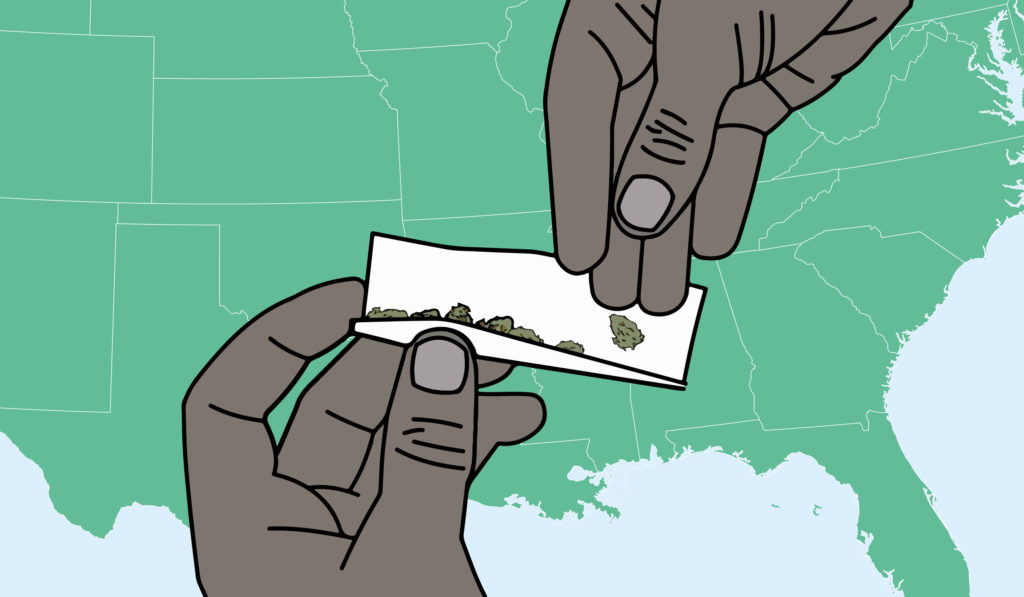On 4/20, a Zoom panel about cannabis intersected with the imminent reading of the Derek Chauvin verdict, which highlighted the importance of racial justice in legalizing weed in the South. Five cannabis experts participated in the conversation that ran through the 4:20 hour and purposefully closed just before Judge Peter Cahill read the verdict, announcing that Chauvin was found guilty on all counts for murdering George Floyd.
During a vibrant and, at times, emotional hour, moderator Kassandra Frederique of the Drug Policy Alliance led speakers through a range of questions about what just legalization looks like in the South. Many topics came up, including the racist War on Drugs and its ties to xenophobic immigration policies, the need for more and better racial justice data, the agricultural potential of the South, and the power of faith leaders in drug reform, to name a few. Participants included University of Dayton History Professor Adam Rathge, Devin Barrington-Ward of the Black Futurists Group in Georgia, Lydia Camarillo of the William C. Velásquez Institute in Texas, and Virginia’s very own Chelsea Higgs Wise of Marijuana Justice.
“For us to actually win the drug war, the South has to win,” Frederique said. She stated that reform on the coasts and in the Northeast is not enough. She asked the panelists to reflect on the Southern drug reform landscape, and asked what other regions could learn from the South.
Higgs Wise said this landscape is “shifting very quickly.” She discussed several factors of Virginia’s drug history and culture, including the fact that hemp was farmed by enslaved people in Virginia 400 years ago. She noted that Virginia’s current reform-oriented Democratic legislature and administration were key to advancing its adult cannabis legalization. She said getting racial justice and cannabis policing data in front of them was one of the most effective steps she and her fellow advocates took.
“I also wanted to just bring up the point about knowing what your legislatures’ priorities are for the [General Assembly]… because cannabis is such a big topic, we can weave it into their priorities,” Higgs Wise said. She said, in Virginia, legalization advocates were able to connect cannabis with ongoing pushes for criminal justice reform as well as efforts to address Virginia’s high eviction rates, especially in light of the pandemic. She also said the ongoing racial justice movement is “a big part” of the Southern drug reform landscape. Virginia has a functioning medical cannabis program and is legalizing adult use July 1, with the full legal market launching in 2024.
“I can’t move forward with my remarks without it being grounded in the fact that my heart is in my chest right now,” referencing the imminent verdict, Barrington-Ward of the Black Futurists Group said. He said cannabis reform in the South “cannot be uncoupled from the work around defunding the police, and abolishing prisons and jails; it cannot be disconnected from movement work [or] from the struggle to make sure that liberation is won for Black people in our lifetime.”
Barrington-Ward shared three strategies that he found powerful in Georgia’s drug-reform movement. First, he recommended engaging with faith leaders—a point Higgs Wise also made. Barrington-Ward spoke of branding the issue as a moral one; “It is morally wrong to lock up people and to throw their lives away over cannabis.”
Second, he encourages city and county-level activists and government representatives to take their reform movements as far as they legally can in order to put pressure on the state. In Georgia, multiple jurisdictions have decriminalized cannabis within their borders. Third, he discussed how important it is to push business-minded representatives to embrace the cannabis industry, using Atlanta’s Black entrepreneur culture as an example. “Officials [are] bragging about how Atlanta is the place for Black business to thrive and to flourish—well, is it truly that place, if we’re locking people out of a $23 billion industry?” Georgia currently maintains cannabis prohibition. There are some exceptions for low-THC medical products, and successful localized decrim measures. State legislative reform efforts are in play.
Camarillo of the William C. Velásquez Institute said, for Latino farmers in Texas, cannabis “is part of our history… [Native Americans] were using it as part of their medicine in times when the United States was still part of Mexico.” She spoke of the importance of engaging the older Latino community in Texas in conversation around cannabis reform—a topic many understandably feel is stigmatized by the War on Drugs. She said focusing on racial justice and the financial benefits of legalization for the state were powerful in engaging these communities.
Camarillo also pointed out that tax money could be a strong driver for conservative legislators. “We have to remind [conservatives] of the billions of dollars that are being lost and wasted by not taxing the [cannabis] industry.” She also said, “The War on Drugs is really an attack on Latinos and Blacks; on communities of color.”
Cannabis use is illegal in Texas, with some narrow medical allowances, though multiple cannabis-related bills have been considered recently.
In closing, Frederique named and honored Black people whom police have murdered, including George Floyd and Breonna Taylor.
“We understand that [4/20] is a celebratory day for many people but not everyone has the same access to that celebration,” she said. “We will continue to have this conversation and, to everyone that is following the Derek Chauvin trial, we’re sending love and light to you.”

